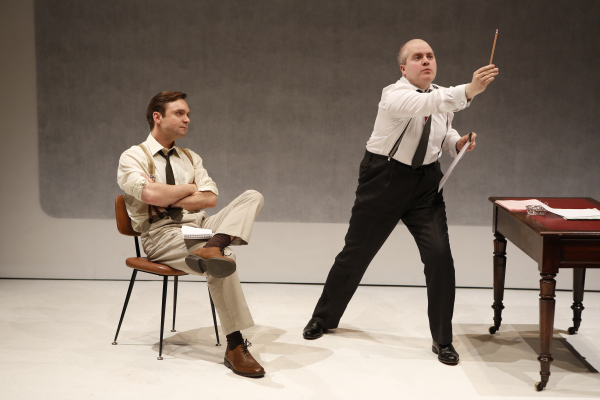The Lovesong of Alfred J. Hitchcock

(© Carol Rosegg)
The enigmatic master of suspenseful camera angles, tortured blondes, and stifling mothers is placed under a Freudian lens in English playwright David Rudkin's poetic character study, The Lovesong of Alfred J. Hitchcock, now playing at 59E59 Theaters as part of the Brits Off Broadway Festival. Beyond a fortuitous opportunity for play on words, Rudkin draws apt comparisons between the frustrated director and T.S. Eliot's famously repressed J. Alfred Prufrock. His title character delves into the deepest corners of his oedipal mind, delivering probing soliloquies as he works through the damaging memories of childhood that shaped him into the celebrated director who ruined showers for millions.
Designer Juliet Shillingford sets the scene on a blank canvas. A white stage with a stark wall behind it resembling a movie screen houses nothing but a director's chair — the throne from which Hitchcock presides over his kingdom of horror. This empty space leaves a perfectly sterile environment for an uninterrupted examination of the subject at hand. Unfortunately, this notable absence of distractions leaves little room for error in Martin Miller's portrayal of the iconic filmmaker. Miller is faced with the challenge of both accurately embodying the physicality of the rotund, British director and subtly communicating the inner life of his inscrutable character — two tasks that Miller, along with director Jack McNamara, vastly overshoots.
Miller opens the play from his directing perch, wearing his character's signature black suit and tie, as he maps out what we later gather to be a scene from his classic thriller Vertigo. His words introduce us to the thoughtful, detailed man behind his famously intricate films, though his exaggerated manner is much more demonstrative than his speech implies. Miller's attempt to mimic Hitchcock's mildly haughty air remains a shallow impersonation that leaves us stranded at the surface of a man whose protective outer layers we were promised would be cut away. The play is peppered with several similar monologues, many of which depict Hitchcock directing his own life as if it were one of his suspenseful films, painting a portrait of an isolated man, only able to find solace in his vivid imagination.
These speeches, delivered in a dreamlike haze, should feel like intimate and revealing glimpses into an otherwise steel-bolted psyche. However, while Rudkin's language vividly paints Hitchcock's dramatic images (fitting for a piece that began its life as an evocative radio play — what Rudkin labeled a "film for radio"), each portrait does little to reveal new or unexplored contours of Hitchcock's identity. The few insights we are afforded are delivered by Hitchcock himself, who seems all too keen on performing his own psychoanalysis. McNamara additionally burdens the imagery-packed language with the task of creating most of the show's "visual" effects — a potentially successful vehicle for a radio piece but one that leaves many voids in a theatrical setting. Matching Hitchcock's own genius for building dramatic tension — and without the luxury of a camera lens — is a tall order. Yet, when the majority of the play is unabashedly filtered through Hitchcock's mind's eye, to shy away from his visual motifs (save a few menacing shadows crafted by lighting designer Asuza Ono) leaves a gaping hole.
In between Hitchcock's solitary moments, we meet several ancillary characters from throughout Hitchcock's life who help shine a light on his character. Miller portrays him as a young boy, self-conscious of his portly stature, standing at the bedside of his suffocating mother, Emma (played by an understatedly threatening Roberta Kerr) — a woman who inspired many of his future characters and first introduced him to the concept of fear with her first utterance of the word "Boo." Kerr appropriately doubles in the role of Hitchcock's wife, Alma, whom we find at a typewriter after his death. She attempts to pen an autobiography about her life with her blood-lusting yet passionless husband, who often found himself in the middle of accusations of sexual assault against his blonde leading ladies (most famously Tippi Hedren).
We are also privy to a disciplinary moment between young Alfred and a Jesuit teacher (a perfectly stern Anthony Wise) and several moments of creative collaboration between the director and one of his screenwriters (capably portrayed by Tom McHugh). This collection of characters casts a vague shadow of the elements that shaped Hitchcock's creative trajectory. However, Alma and Emma — the two leading ladies of his life — scream for sharper focus, being the two women who had the greatest impact on his career and whose complementary characters lend an artistic symmetry to the scattered piece. Without this added meat to the play's platter of overwrought emotions, it becomes an unwieldy melodrama even Hitchcock couldn't defend.











